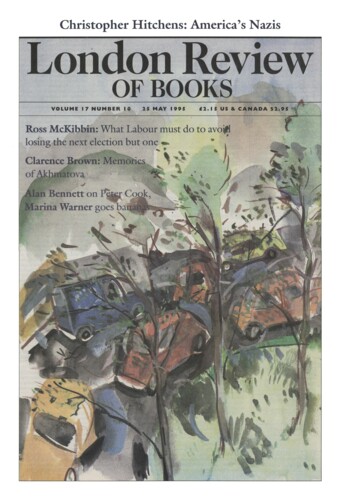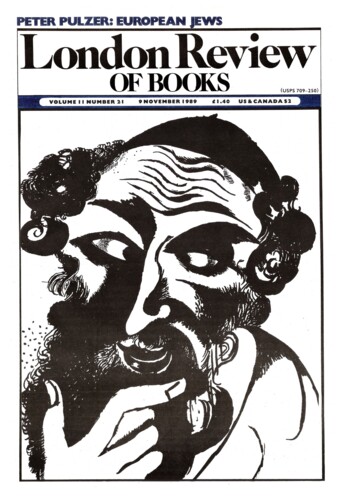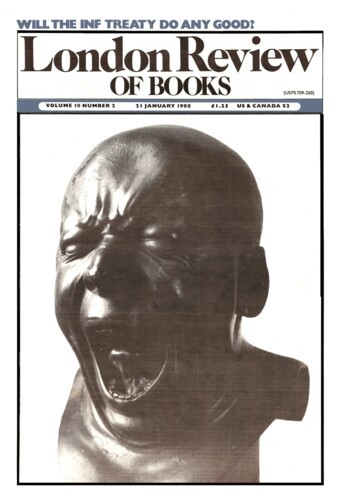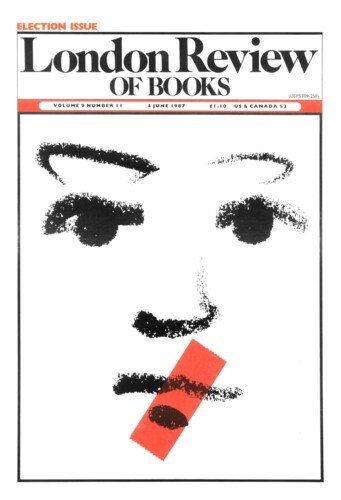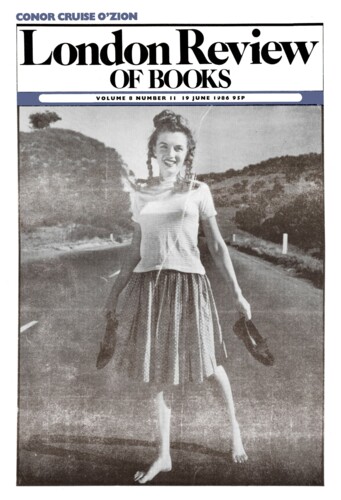Brian Harrison
Brian Harrison is a fellow and tutor in modern history and politics at Corpus Christi College, Oxford. He is the author of Drink and the Victorians, Separate Spheres and Peaceable Kingdom, and, with Colin Ford, of A Hundred Years Ago: Britain in the 1880s in Words and Photographs.
A Slight Dash of the Tiresome
Brian Harrison, 9 November 1989
Intellectuals – informed people who enjoy accumulating and diffusing ideas – were more prominent in Victorian public life than they are today. Public life was then confined to a well-educated élite, and intellectual activity was less rarefied in language, less specialised in scope, more readily discussed in periodicals designed for general circulation. Politics, literature, religion, scholarship and even natural science all fertilised one another. The cultivated ‘man of letters’, broad but selective in his reading, moulded taste. Universities have subsequently hived off much intellectual activity into academic journals inaccessible to the educated public. They have converted associations such as the British Academy and the Royal Society, where the layman was once made to feel at home, into learned societies. H.A.L. Fisher threatened to resign from the British Academy in 1938 if it refused to recommend Winston Churchill for election: such a decision, he said, would ‘mark the triumph of a tendency towards minute specialisation … which I have long watched with concern, as likely to rob the Academy of its national character’.’
Votes for Women, Chastity for Men
Brian Harrison, 21 January 1988
Social movements have been in vogue among British historians since the 1950s. This is partly because Labour’s agenda, strangely combining statist welfare and libertarian protest, has dominated the political and intellectual climate. But there is also a professional reason for these historiographical priorities. The reaction against the narrowness of the old political and constitutional history has never been complete: by choosing social movements as their theme, historians could simultaneously ride the old and respectable horse of political history and the new and fashionable one of sociology. Political history provided a secure chronological framework while they ventured forth into the vast unknowns of social class, religious denomination and regional culture. Edward Thompson’s Making of the English Working Class (1963) was a landmark here, and we now possess histories of feminism, pacifism, of the movements against slavery and cruelty to animals, and for free trade, family allowances, factory-hours and public health, to name only a few.
Coalition Phobia
Brian Harrison, 4 June 1987
If there is a third successive Conservative election victory this summer, Labour will plunge once more into debating its own history. Not reluctantly, because as Kenneth Morgan points out, the Party ‘has been captivated, even obsessed, by its history’; even more than the Conservatives it is, he says, ‘a prisoner of its past’. Yet the debate will probably be more painful than in the recent past, because it will need to be more searching and less sectarian. In important ways, Morgan’s book of biographies will fertilise the debate. Its clear style promises the first essential: plenty of readers. Most of its 27 biographies originated as book reviews and – in the tradition set by A.J.P. Taylor – they reappear without footnotes or full scholarly apparatus, though with a substantial ‘Select Bibliography’. The newcomer gets double value from a book of this kind, for it combines surveying the abundant recently-published material on 20th-century British labour history with the integrating perspective of a sympathetic and very knowledgeable historian. Morgan’s biographies do not aim at any deep analysis of personality; nor are they as preoccupied with the organisational and structural constraints on the individual as the blurb leads one to expect. They aim rather to set each subject briefly into context, and then straightforwardly to narrate the essentials of his career. The individual’s contribution to the Labour movement is specified; assets and drawbacks are carefully juxtaposed; and at the end a balance is struck which aims at fairmindedness and usually attains it.’
Old Verities
Brian Harrison, 19 June 1986
Suddenly the Victorians have become controversial again. This is not because a new Lytton Strachey has sprung up in our midst, but because Mrs Thatcher – who polarises public opinion more forcibly than any prime minister since Gladstone – appropriates ‘Victorian values’ for herself and her party: ‘those were the values when our country became great,’ she told Brian Walden three years ago. The publication of these four books provides a timely opportunity for testing her claims. Historians, mostly on the left, have so far dismissed them, and even those not on the left rightly worry about the propagandist way in which Thatcher uses history; in a complex world their intellectual fastidiousness jibs at her confident certainties, simple remedies and evangelical tone. But her confident certainties are echoed on the other side: Michael Foot condemns her for praising Victorian values ‘without even a passing comprehension of the human suffering and indignity which the mass of our people had to endure in that pre-democratic age’.’
Pieces about Brian Harrison in the LRB
Our Island Story: The New DNB
Stefan Collini, 20 January 2005
A dictionary is, first and foremost, a practical resource; its usability when subjected to a variety of everyday scholarly demands must be the chief test of its worth. But a work on the scale of
Read anywhere with the London Review of Books app, available now from the App Store for Apple devices, Google Play for Android devices and Amazon for your Kindle Fire.
Sign up to our newsletter
For highlights from the latest issue, our archive and the blog, as well as news, events and exclusive promotions.
